How to host an event (in a way that is fun and connecting for YOU too)
I’ve been finding that more and more people in my life are interested in hosting events. They want to bring people together for dinner parties, game nights, and morning coffee.
And I’m all about it. More event hosts equals more unique events, and more interesting ways for us to gather, connect, and build community. Also I think hosting is just such a special thing that everyone should experience. There is something so magical about bringing your favorite people together and watching them connect around something silly, emotional, or creative that you put together.
Yet, so many of us hesitate to bring our events to life. Why? Because it seems like so. much. work. All that emotional labor before, during, even after an event. What day should we host it? Who’s actually interested? Are people even having a good time?
But let me let you in on a secret.
It doesn’t have to be this way.
After a year of hosting a whole slew of events, I’ve discovered that there are ways to make hosting feel easier and so much more fun.
Here are five guiding principles to help you host a great event, and in a way where you can enjoy your own event too.
1) Be honest with yourself about the kind of event you want to host (not what your guests want)
When I first began hosting events, I spent a lot of time thinking about what everyone else would want and how to make that happen. What kind of food should I make? What games would people want to play? What should we talk about?
I did this because I cared so much about everyone enjoying my event. Wasn’t this the best way to ensure that people were happy?
The problem was, when I hosted events with this mindset, I questioned my instincts and decisions. I felt incredible unsure as a host, and that made event hosting really hard.
After suffering through this cycle numerous times, I realized something.
If I was going to put this much effort into hosting, why not host something that I actually wanted for myself?
For me, that looked like a potluck — but where you can truly bring anything. Screw spending hours making that perfect, fancy dish. Bring a simple casserole, some leftover crackers and cheese, a stir fry that you made with the leftovers in your fridge. Because for my potluck, the focus wasn’t the food. It was the people. It was about coming together on a Sunday night and feeling totally okay showing up kind of messy, with a good enough dish, and connecting as perfectly imperfect humans.
Before figuring out what everyone else wants, I encourage you to forget the others in the room. Forget what you’re willing to settle for, or what you think is or isn’t possible to create.
Instead, take a moment to check in. What event would YOU love to see? How do YOU want to feel during it? What do YOU want out of it?
Get in touch with what is truly driving you to host. Find that inner excitement. And then build your event from there. I assure you that your friends will love to see what it is that actually gets you excited.
2) Treat it as an experiment
If I had to guess, you (just like I) are not a professional event planner. We don’t do this for our livelihood.
So then why do we put so much pressure on ourselves to get it right??
What if we instead treated event planning like an experiment?
Experiments are built for learning. They’re raw. They’re messy. You’re literally supposed to try lots of different things and get it wrong in order to see what actually works.
It was this mindset that got me to run my first event at The Commons (where we literally just played We’re Not Really Strangers together) because I wanted to see: were there people here who’d be game to get to know each other on a deeper level? (conclusion: there were!)
It was also this mindset that got me through the second event I tested there — to which no one showed up. A past me would have been devastated and deeply embarrassed. But what was interesting was that with this mindset, I actually forgot that this was technically a failure. What I ended up feeling was just really curious. What was it about this event idea that didn’t resonate here?
What’s also cool about adopting an experimental mindset is that it doesn’t just have to be limited to you. You can let your guests in on it too.
I love telling people upfront that I’m trying something new because 1) it helps me step away from my need to perform and 2) it helps my guests have a much more open mind coming in. It ends up feeling like we’re in the experiment together, and that can create so much more space for us to improv, try different things, and have fun.
3) You don’t have to do it alone
Letting people in on your event planning process is one of the best ways that you can lower the friction to getting started.
This can look like:
When you have an idea, asking your most supportive friends if you can share it with them and get their feedback
Asking someone if they’d like to co-host and co-build an event with you
When I first decided I wanted to host community events, I remember feeling completely paralyzed about where to begin. That’s when I decided to ask my friend Grace if she wanted to do it with me. Even though we were friends, asking her was kind of scary (my rejection meter was so low eep!), but when she said yes, I was over the moon. Now I had a buddy! Now I had someone with whom I could discuss all of my ideas and logistical concerns. I also had a guaranteed guest (which was honestly so reassuring because even if no one else came, we’d still have a good time hanging out together).
Now that we were co-hosting, event planning felt fun, and I was so ready to bring this community building thing to life.
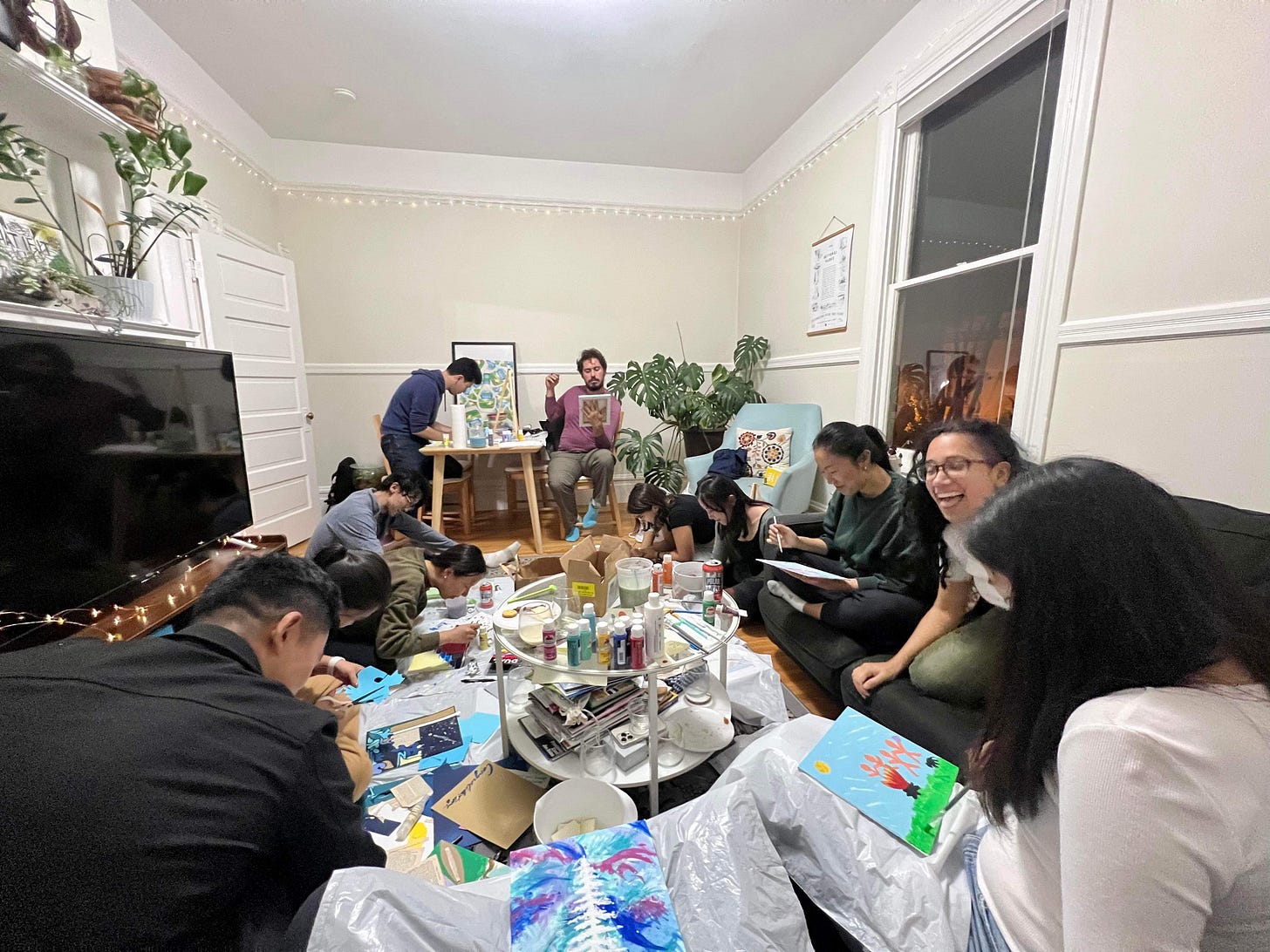
Since then, I haven’t always needed a co-host/co-collaborator, but I will pull this tool out of my my back pocket any time I feel a little bit scared around a new idea. Because really we don’t have to be so alone in our event planning process. And by being vulnerable, we also let in just a little bit more connection into our lives as well :)
4) Be explicit about who you want to invite… and not invite
I used to feel bad at the idea of excluding people from my guest list. But after reading Priya Parker’s The Art of Gathering, I began to wonder: could being choosy about who you invite (and don’t) actually be the more gracious thing to do?
I decided to try it with an event I call the Think and Drink. The way it works is that a few guests will share a story/mini talk with the group on a certain topic. The twist? 1) these guests are randomly selected and 2) we don’t tell you the topic until the night of.
To me, this event wasn’t about giving the best presentation. What it was really about was getting to know new people. But for that to work, my guests had to be in on it.
So in the invite, I just straight out said it. If you were all for meeting new people, come through! If that wasn’t your cup of tea, then this wasn’t for you (though I still love you regardless!)
When I sent that first invite, I was so nervous. What if people I liked said no? What if everyone said no? But the nerves were worth it. Because when the day arrived, those that came were totally bought in. They came ready to share stories, start conversation, and make friends. And that gave me the safety and permission I needed to go all in on the theme and host a bomb-ass event.
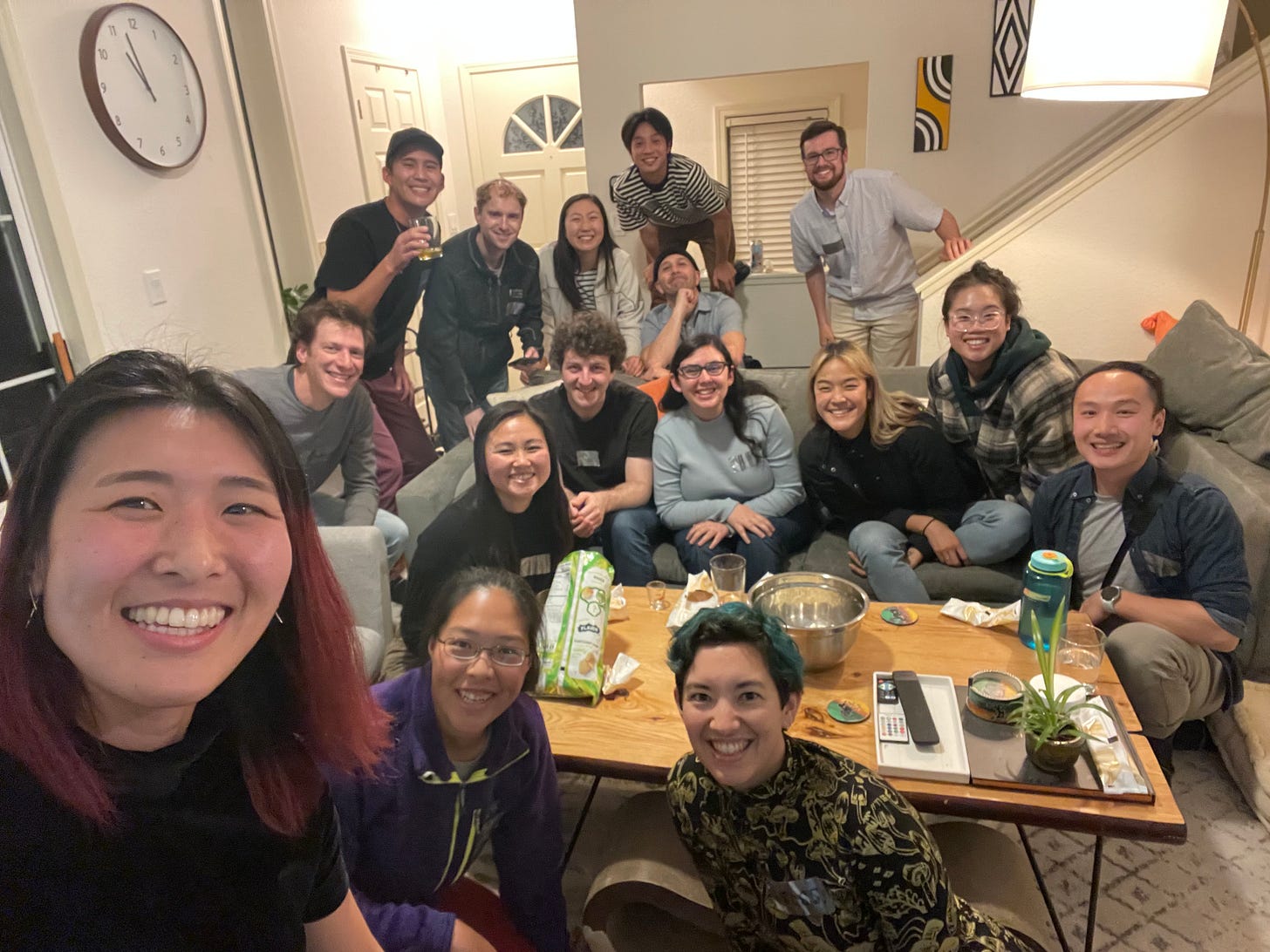
5) Trust your guests
As a host, it can feel like it’s our job to make sure everyone is having a good time. Does anyone look like they’re feeling awkward? Lost? Bored? How can we make them feel better?
But this way of hosting comes at a cost. How many times have you found yourself at the end of a night feeling absolutely emotionally spent, but also not really feeling like you got the chance to deeply talk to anyone or enjoy your own event?
The thing is, I don’t think we actually have to do this.
What if we trusted our guests instead?
What if we trusted our guests to mingle and strike up their own conversation? What if we trusted that they’d help the night flow? What if we let them help us clean up when they offer?
Every single one of your guests is choosing to come to your event. You didn’t force them to come. They know if they signed up for meeting new people, a rager, or something heart-felt and squishy. They also likely know that running an event is hard and are probably incredibly grateful that you created this space for them to gather with others.
Your guests signed up because they want to have a good time. And especially if it’s a small-scale event for friends, they will do their part to make that happen.
I had to constantly remind myself of this when I hosted my first “Dream Party”, a heart-felt, squishy event where people came together to share their dreams for 2025. This particular event concept was quite vulnerable to me. What helped was that I could tell that the people that attended really wanted me to succeed. They were ready to try new things, openly share their emotions, and build off of my ideas. And they took care of their needs, taking charge of snacks, breaks, and ordering dinner.
Trusting in my guests meant that I didn’t have to overplan. I didn’t have to get things perfect. And I most certainly didn’t have to caretake. We could create this event together — and that made it so much more fun.
More easeful hosting actually creates better connection
Making event hosting more enjoyable really just comes down to a shift in our mindset. It’s about realizing we don’t have to please everyone with what we create, we don’t need to be perfect, and we definitely don’t have to do it on our own.
The event planning process can actually be more human.
You can be more human.
It’s in that humanness that your guests will get to see more of who you truly are, you will find that you can trust and rely on those that attend, and you will build deeper connection — which is likely the very reason you wanted to host events in the first place :)
—
Thinking of hosting an event? I’m hosting an in-person gathering for event hosts (ooh so meta) to plan their next event! Because doing this stuff is always more fun together (and I’m positive it’s going to be the most supportive group of people :)) — RSVP here
Otherwise, if you’ve got an event idea you’re stuck on, want to jam on, or would just like to share out loud, hit me up! I’d love to hear from you <3


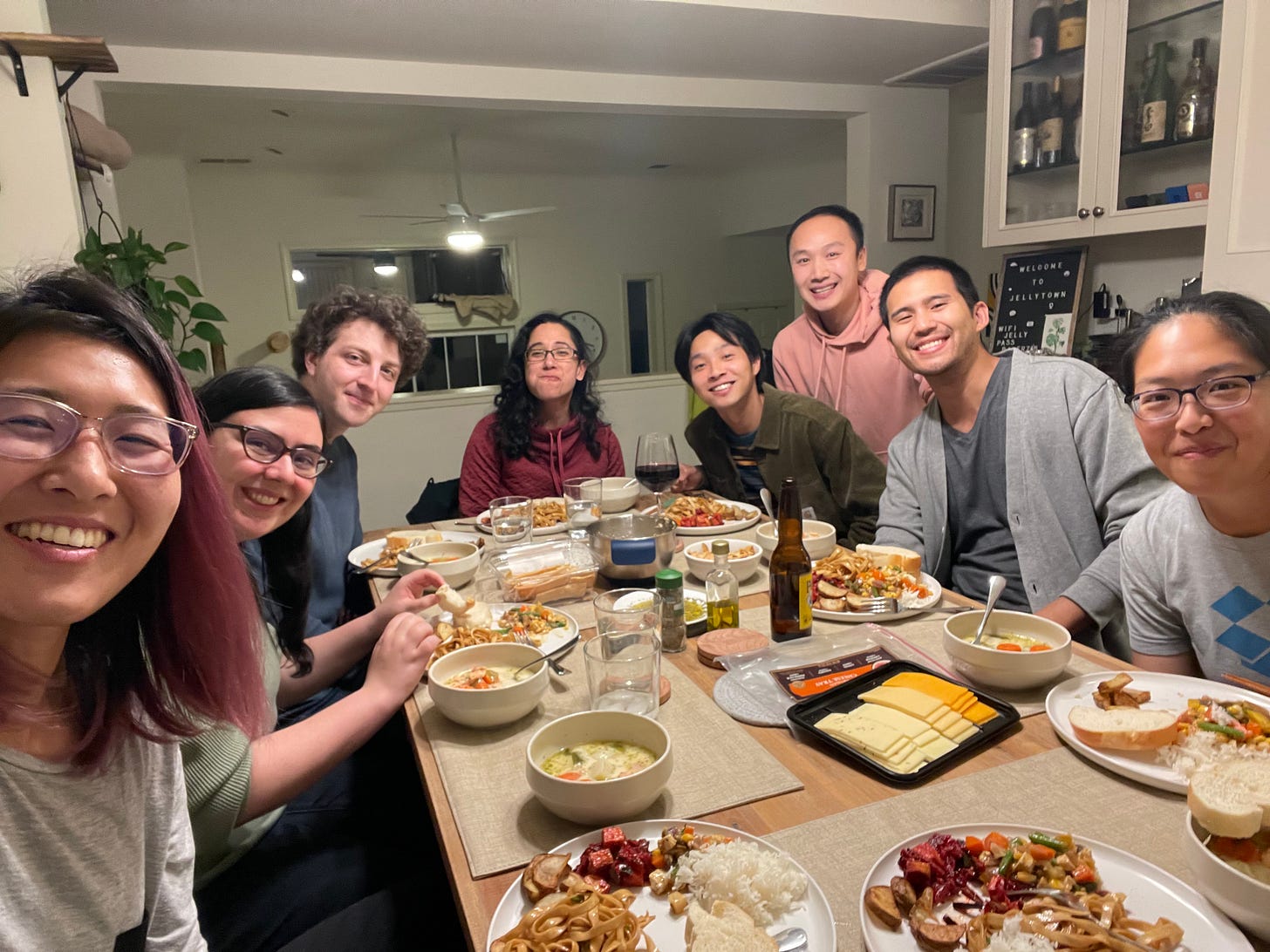
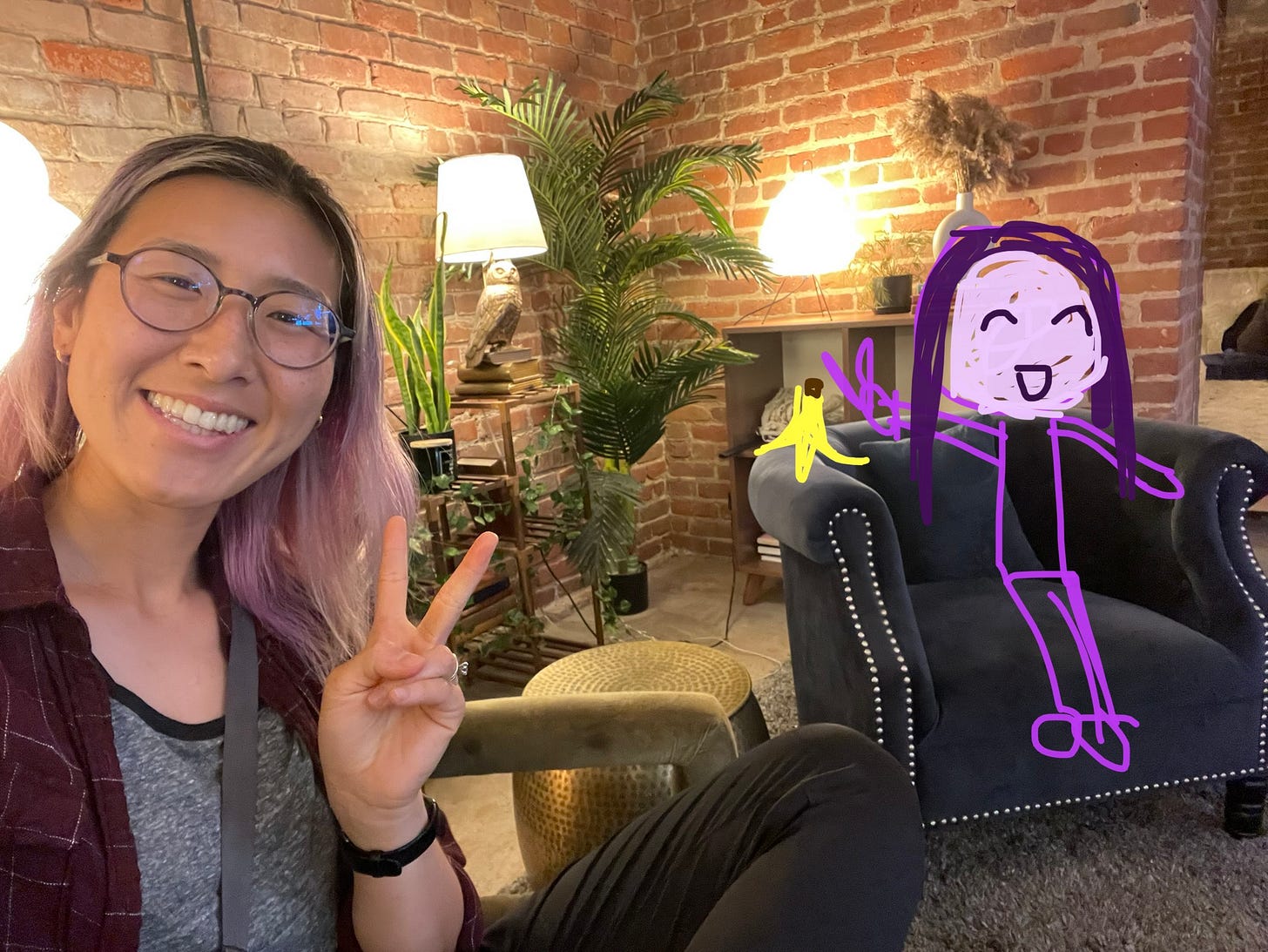
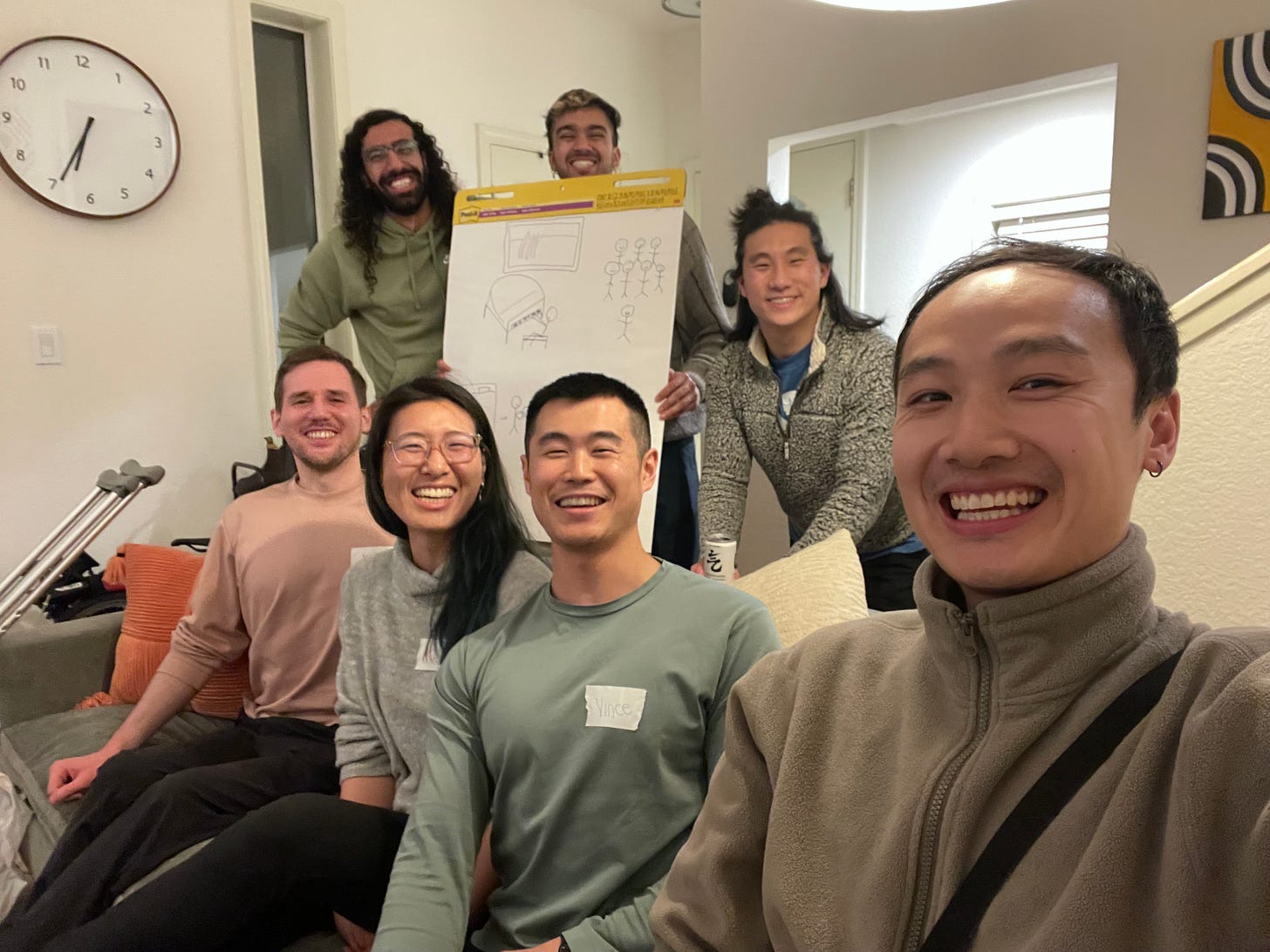
what wonderful guidelines! i love "trusting your guests." Trust, like courage, is doing it in spite of fears, anxiety and trepidation. That's enough to make anyone run towards contracts, safety and certainty. But the irony of trust, is that can only be built in the absence of absolutes. Your guidelines help provide structure for, more comfortably, building trust.
I love the focus on human-ness and connection! Thanks for sharing this unique perspective! This is so important!